Amazon parrots, with their striking plumage colors and charismatic personalities, have long captured the hearts of bird enthusiasts. But before bringing one of these magnificent creatures into your home, it’s important to consider whether are Amazon parrots good pets.
While Amazon parrots can be delightful companions, their suitability as pets depends on various factors, including their individual temperament, social needs, and the commitment required to meet their specific care requirements.
On the positive side, these parrots are known for their intelligence, playful nature, and ability to form strong bonds with their human caregivers.
In this article, we will delve into the pros and cons of keeping Amazon parrots as pets, shedding light on the joys and challenges that come with sharing your life with these intelligent and captivating avian companions.
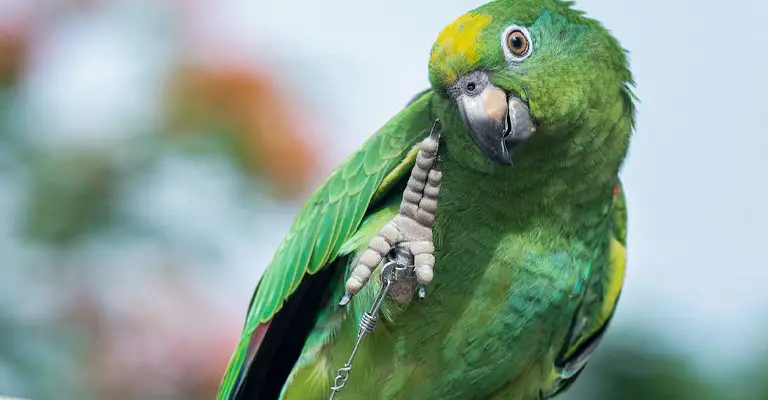
Are Amazon Parrots Good Pets?
Amazon parrots can make wonderful pets for the right person or family. However, it’s important to consider several factors before deciding to bring one into your home.
Personality and Socialization
Amazon parrots are known for their vibrant personalities. They are intelligent, curious, and can be quite entertaining. They enjoy interacting with their human companions and can form strong bonds with them.
However, they can also be demanding and require a lot of attention and mental stimulation. If you’re looking for a pet that will engage with you and be a constant source of entertainment, an Amazon parrot might be a good fit.
Long Lifespan
One important thing to consider is the lifespan of an Amazon parrot. These birds can live for several decades, with some species reaching up to 50 or 60 years of age.
This means that owning an Amazon parrot is a long-term commitment. You need to be prepared to provide care and attention for the bird throughout its entire life.
Noise Level
Amazon parrots are known for their vocal abilities. They can be quite loud and have a wide range of vocalizations, including squawking, whistling, and mimicking human speech.
If you live in an apartment or have close neighbors, the noise level of an Amazon parrot may be a concern. Proper training and socialization can help minimize excessive noise, but it’s important to be aware of this aspect before bringing one home.
Training and Enrichment
Amazon parrots are highly intelligent and require mental stimulation to thrive. They need plenty of toys, puzzles, and interactive activities to keep them engaged.
Training is also essential to ensure they develop good behavior and social skills. Positive reinforcement techniques work well with Amazon parrots, and they can learn tricks and commands with patience and consistency.
Space and Exercise
Amazon parrots are active birds and need ample space to move around. A large cage is necessary to provide them with enough room to stretch their wings and climb.
Additionally, they require regular exercise outside of the cage. Providing supervised playtime outside the cage, preferably in a bird-safe area, is important for their physical and mental well-being.
Veterinary Care
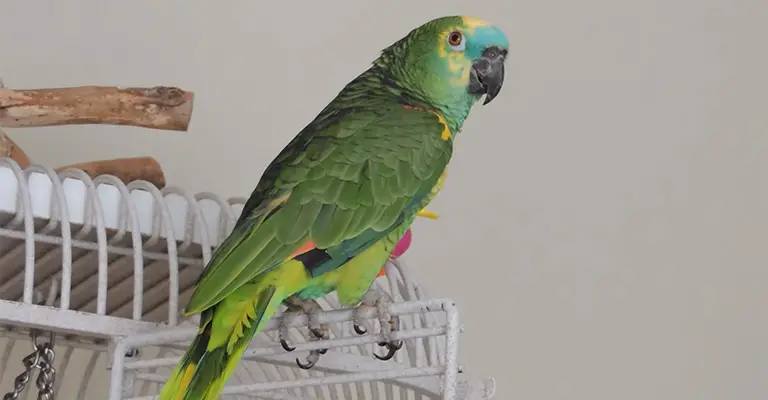
Like any pet, Amazon parrots require regular veterinary care. Annual check-ups, vaccinations, and beak and nail trims are essential for their health.
It’s important to find an avian veterinarian who is experienced in treating parrots to ensure proper care and early detection of any potential health issues.
Amazon parrots can make excellent pets for individuals or families who are willing to commit to their long lifespan, provide them with proper care, attention, and mental stimulation.
However, it’s crucial to thoroughly research and understand their needs before bringing one into your home.
Beauty and Colorful Plumage
Amazon parrots are known for their vibrant and colorful plumage. Their feathers can be a stunning combination of greens, blues, yellows, and reds, making them visually appealing pets.
Playful and Affectionate Nature
Many Amazon parrots have a playful and affectionate nature. They enjoy interacting with their human companions, such as cuddling, preening, and even giving gentle nibbles as a sign of affection. Their social nature can make them great companions.
Ability to Mimic Human Speech
Amazon parrots are renowned for their ability to mimic human speech. While not all individuals will develop this skill, many can learn to imitate words, phrases, and even songs. This talent can be entertaining and create a unique bond between the parrot and its owner.
Strong Bonding Potential
With proper socialization and training, Amazon parrots can form strong bonds with their owners. They often develop a deep sense of loyalty and can become lifelong companions. This bond can bring joy and fulfillment to the owner-pet relationship.
Species Variety
There are various species of Amazon parrots, each with its own unique characteristics and traits.
This diversity allows potential owners to choose a species that aligns with their preferences and lifestyle. Some species may be more talkative, while others may be more playful or calm.
How to Care for a Pet Amazon Parrot?
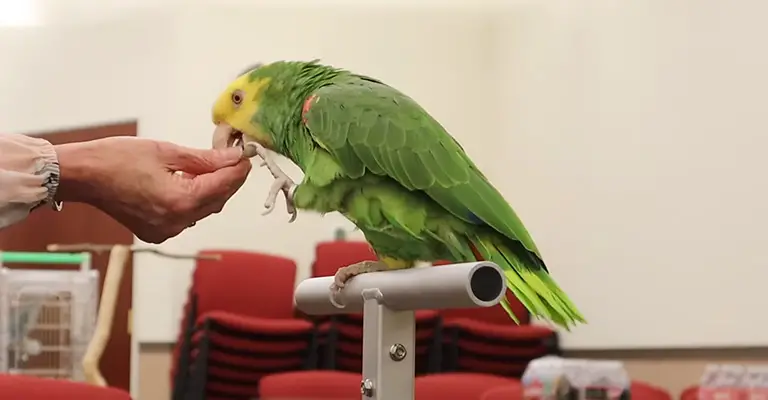
Caring for a pet Amazon parrot requires attention to its physical, mental, and emotional well-being. Here are some essential guidelines to ensure their proper care:
Housing
Provide a spacious cage that allows your Amazon parrot to move around comfortably. The cage should be made of sturdy materials and have horizontal bars for climbing. Include perches of varying sizes and materials to promote foot health.
Diet
Offer a balanced diet consisting of high-quality pellets, fresh fruits, vegetables, and occasional nuts or seeds. Avoid feeding them toxic foods like avocado, chocolate, caffeine, and alcohol. Provide fresh water daily.
Mental Stimulation
Amazon parrots are intelligent and require mental stimulation to prevent boredom. Offer a variety of toys, puzzles, and foraging opportunities to keep them engaged. Rotate toys regularly to maintain their interest.
Social Interaction
Amazon parrots are social creatures and need regular interaction with their human caregivers. Spend time talking, playing, and bonding with your parrot daily. Consider getting them a companion if you cannot provide enough social interaction.
Exercise
Allow your Amazon parrot to exercise outside of the cage daily in a safe and supervised area. Provide flight opportunities or encourage them to climb and explore.
Veterinary Care
Schedule regular check-ups with an avian veterinarian to monitor your parrot’s health. Vaccinations, parasite control, and beak and nail trims may be necessary.
Environmental Enrichment
Create an enriching environment by providing natural branches, safe chew toys, and opportunities for bathing. Offer a variety of perches and rotate them to prevent foot problems.
Training and Socialization
Train your Amazon parrot using positive reinforcement techniques to teach them basic commands and good behavior. Socialize them with different people, environments, and experiences to ensure they are well-adjusted.
Personality and Behavior of Amazon Parrots as Pets
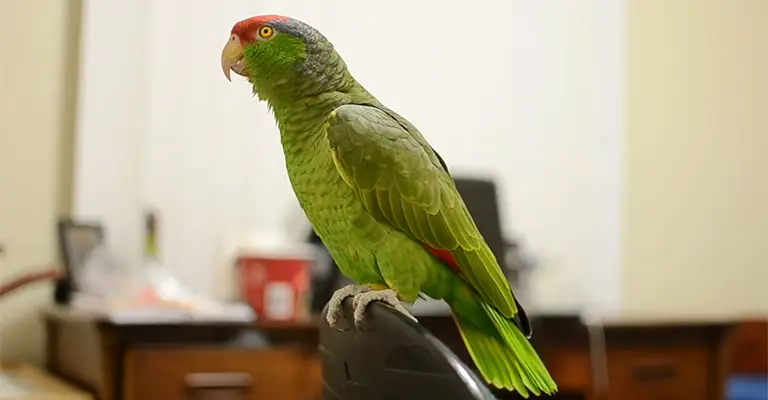
Amazon parrots are known for their vibrant personalities and engaging behaviors, making them popular pets among bird enthusiasts. Here are some key aspects of their personality and behavior as pets:
Intelligence
Amazon parrots are highly intelligent birds. They have the ability to learn and mimic sounds, words, and even complex phrases. Their cognitive abilities make them quick learners and allow for interactive and engaging experiences.
Social Nature
Amazon parrots are social creatures that thrive on companionship and interaction. They form strong bonds with their human caregivers and enjoy being part of the family. Regular socialization and quality time spent with them are essential for their well-being.
Playfulness
These parrots have a playful and curious nature. They enjoy exploring their environment, solving puzzles, and interacting with toys.
Providing them with a variety of toys and opportunities for mental stimulation is important to keep them entertained and prevent boredom.
Vocalization
Amazon parrots are known for their vocal abilities. They have a wide range of vocalizations, including squawks, whistles, and mimicry of human speech.
While this can be entertaining, it’s important to note that they can be noisy at times, especially when seeking attention or expressing their emotions.
Emotional Sensitivity
Amazon parrots are emotionally sensitive creatures. They can form deep attachments to their human caregivers and may experience separation anxiety if left alone for extended periods.
They thrive in environments where they feel loved, secure, and included as part of the family.
Territorial Behavior
Amazon parrots can exhibit territorial behavior, especially around their cages or favorite perches.
It’s important to establish boundaries and provide them with a designated space of their own while also allowing them to explore and interact outside of their enclosure.
Potential for Aggression
Some Amazon parrots may display aggressive behavior, especially during hormonal periods or if they feel threatened. Proper training, socialization, and understanding their body language can help prevent or manage aggression.
Disadvantages of Keeping Amazon Parrots as Pets
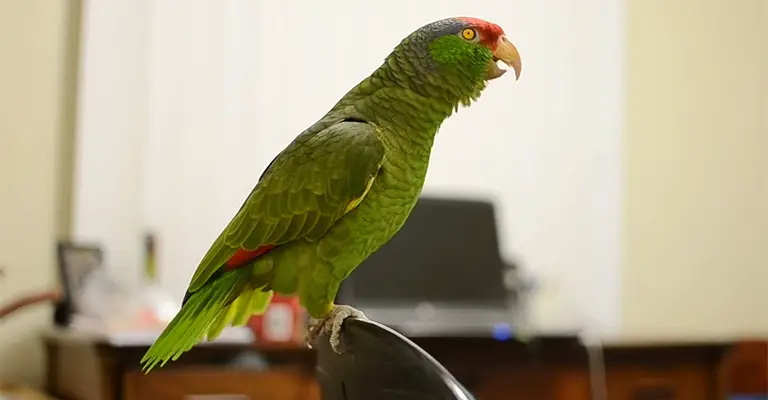
While Amazon parrots can make wonderful pets, it’s important to consider the potential disadvantages and challenges that come with owning them. Here are some factors to keep in mind:
Long Lifespan
Amazon parrots have a long lifespan, often living for several decades. This means that owning an Amazon parrot is a long-term commitment that requires planning for their care throughout their entire life.
Noise Level
Amazon parrots are known for their vocalizations, which can be loud and frequent. They may squawk, scream, or mimic sounds, including human speech.
This can be disruptive, especially in apartment or close living situations. It’s important to be prepared for the noise and consider the impact it may have on your household and neighbors.
Need for Social Interaction
Amazon parrots are highly social birds and require regular interaction and companionship. They thrive when they have ample time outside of their cage, engaging with their human caregivers and other birds.
If they don’t receive enough socialization, they may develop behavioral issues or become stressed.
Potential for Destructive Behavior
Amazon parrots have strong beaks and a natural inclination to chew. Without proper mental stimulation and enrichment, they may resort to destructive behaviors, such as chewing on furniture, walls, or other household items.
Providing a variety of safe and engaging toys is essential to redirect their chewing instincts.
Mess and Feather Dust
Amazon parrots can be messy pets. They may scatter food, throw debris from their cage, and produce feather dust. Regular cleaning and maintenance are necessary to keep their environment clean and hygienic.
Allergies and Sensitivities
Some individuals may develop allergies or sensitivities to bird dander, feathers, or dust. It’s important to consider the potential impact on household members who may have allergies or respiratory conditions.
Veterinary Care
Avian veterinary care can be specialized and potentially more expensive than regular pet care. Finding a qualified avian veterinarian and budgeting for routine check-ups, vaccinations, and potential health issues is crucial for the well-being of your Amazon parrot.
FAQs
While Amazon parrots can make great pets, they may not be the best choice for beginners. Their intelligence, social needs, and potential for noise and destructive behavior require experienced and dedicated owners who can provide proper care, training, and socialization.
Amazon parrots have a long lifespan and can live for several decades. Some species can live up to 50-60 years or even longer with proper care.
Potential owners should be prepared for the long-term commitment and responsibility that comes with owning an Amazon parrot.
Yes, Amazon parrots require a significant amount of attention and social interaction.
They are highly social birds and need regular interaction with their human caregivers to thrive. Neglecting their social needs can lead to behavioral issues and stress.
Yes, Amazon parrots are known for their ability to mimic sounds and human speech. While not all individuals will develop extensive vocabularies, many Amazon parrots can learn to say words, phrases, and even hold conversations with their owners.
Apartment living can be challenging for Amazon parrots due to their vocal nature. Their loud vocalizations, especially during certain times of the day, may disturb neighbors.
Additionally, their need for space and mental stimulation may be limited in a smaller living environment.
Parting Words
Deciding whether Amazon parrots make good pets requires careful consideration and understanding of their unique needs.
They can provide endless entertainment and companionship. However, it’s important to note that Amazon parrots require a significant commitment of time, attention, and resources.
They thrive in environments that offer mental stimulation, social interaction, and a balanced diet.
Additionally, their long lifespan means that owning an Amazon parrot is a long-term commitment that should not be taken lightly.
Responsible ownership includes providing a spacious and enriching living environment, regular veterinary care, and ongoing training and socialization.
By carefully considering the pros and cons, potential owners can make an informed decision about whether an Amazon parrot is the right pet for them, ensuring a fulfilling and harmonious relationship.